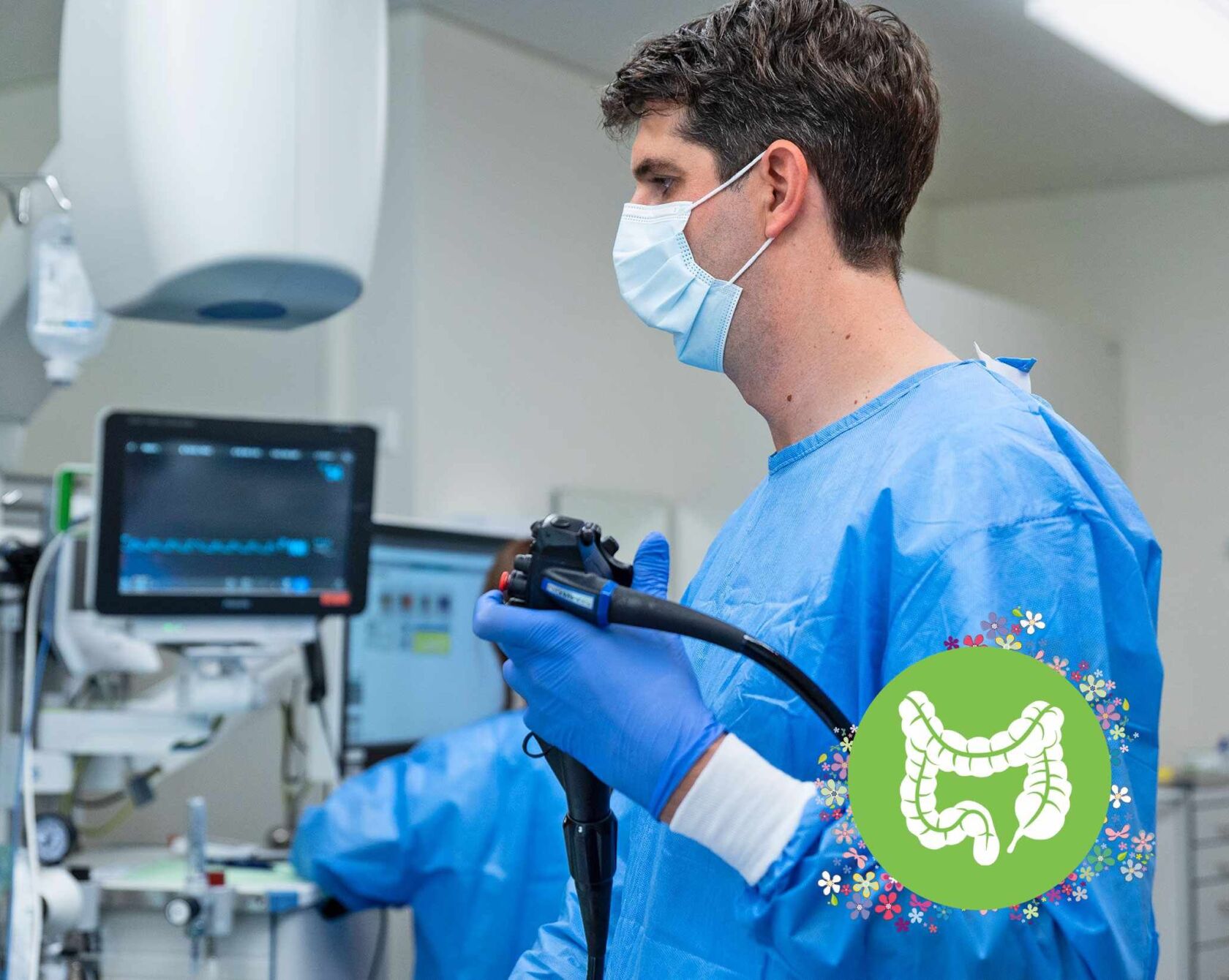A balanced diet and sufficient exercise keep the digestive organ fit. Screening can significantly reduce the risk of bowel cancer.
Text: Helga Kessler
It’s a strange organ: A thin tube five to six meters long with many folds and villi is followed by a thicker section about one meter long. A muscle seals the whole thing gas-tight. The place of digestion may seem very simple at first glance, but it is extremely complex: In the intestine, not only are nutrients broken down and absorbed, but also pathogens are fought off, hormones are released and enzymes and vitamins are produced. “If everything works smoothly, the intestine is healthy,” says Senior Consultant Michael Scharl from the Department of Gastroenterology and Hepatology. To keep the intestine healthy, the intestinal mucosa, which covers an estimated 40 square meters, and the microbiome made up of trillions of bacteria, have to work together perfectly.
Training for the immune system
Mucous membranes are both a barrier and a place of exchange: On the one hand, they prevent the microorganisms from spreading throughout the body and, on the other hand, they are in contact with them, thus training the immune system. “The more different types of bacteria they have, the better,” says Michael Scharl. In the small intestine, the mucous membranes release digestive enzymes and absorb nutrients; in the large intestine, they remove water. Glandular cells produce the mucus which makes boluses and stools slippery. Blood vessels under the mucous membranes transport digested nutrients together with the lymphatic vessels. Millions of nerve cells, largely independently of the brain, regulate the activity of the intestinal muscles, regulate blood flow and the release of hormones. If nerve regulation in the intestine is impaired, this can be seen in the form of abdominal pain, for example in the case of an irritable bowel. Physical well-being is closely linked to the colonization of bacteria in the intestine. Around two kilos of microorganisms are mainly found in the large intestine. In return for accommodation, bacteria of the intestinal microbiome contribute to the synthesis of the feel-good hormone serotonin or the sleep hormone melatonin as well as to the synthesis of vitamins E, B12 and folic acid. The intestinal bacteria are involved in the synthesis of bile acids, and they break down fibers that humans would otherwise be unable to absorb. They produce short-chain fatty acids from cellulose, which in turn serve as food for the bacteria, eliminating pathogens and protecting them against inflammation.
Stool transplantation following infection
If certain bacteria spread at the expense of others, the sensitive system may lose its balance. Particularly feared is an infection with Clostridioides difficile, which leads to severe and life-threatening diarrhea. If treatment with different antibiotics fails, the entire microbiome is replaced by means of a stool transplant. “We do therapy about every other week,” says Michael Scharl. The stool and its bacterial composition provide gastroenterologists with important information, for example about the risk of bowel cancer. Corresponding tests are already under development.
Michael Scharl rather advises against over-the-counter tests that are intended to provide information about possible risks using stool samples: “At the moment, it is not possible to derive enough concrete consequences from this.” The gastroenterologist advises a healthy lifestyle with regular physical activity and a varied diet. “It’s good to have a balanced diet with wholegrain products, legumes, vegetables and fruit, not too much sugar and little processed meat and preferably with fresh products,” says dietitian/therapist Brigitte Baru. Fiber, which is mainly found in plant-based foods, promotes the growth of protective bacteria. However, the recommended 30 grams per day are difficult for most people to reach, says Brigitte Baru. If you want to optimize your diet, it’s best not to do so overnight: “It takes time to change, so the intestine has to be able to get used to the higher amount of dietary fiber.”
Colonoscopy from the age of 50
If the intestinal flora becomes unbalanced , this leads to problems such as diarrhea or constipation. It is more serious if the intestinal mucosa becomes inflamed and begins to proliferate. Malignant tumors can develop from initially benign polyps over time. “From the age of 50, you should undergo an initial colonoscopy, “ says Christoph Schlag, head of endoscopy. In Switzerland’s largest endoscopic center, around 2,700 complete colonoscopies are performed every year. The examination of partial sections (sigmoidoscopy for the last 40 cm, proctoscopy for the rectum and anus) may be useful for monitoring after tumor surgery or for treating hemorrhoids. A full colonoscopy is always recommended for bowel cancer screening. “In 30 out of 100 people, we find polyps that we can remove,” says Christoph Schlag. Unfortunately, not even one in three adults over the age of 50 make use of the screening option in the Canton of Zurich. The gastroenterologist has good news for anyone who is in doubt: “Most people who have already had a colonoscopy say afterwards that it wasn’t that bad.”
Exploration of your own cave system
A light sedative and anesthetic allows the person to sleep nicely covered on the examination chair during the colonoscopy. The gastroenterologist carefully pushes a thin and flexible tube about 1.5 meters long, the endoscope, to the first part of the small intestine. The examiner then begins the slow retraction of the endoscope. The light source and video camera at the top ensure clear images on the monitor – if you are watching instead of sleeping, you will experience an exciting trip into your own cave system. If the gastroenterologist discovers a polyp, they will remove it with a wire loop or forceps. The mucous membranes heal on their own. After about 30 minutes, it’s all over. Time for a coffee.
